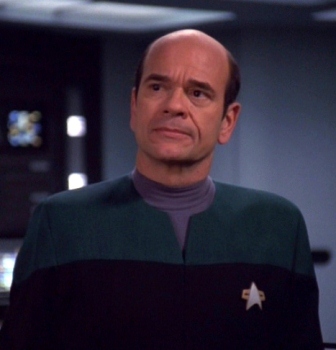ORGANIC FRUIT
Photons Be Free
Free Will vs. Determinism in Star Trek
By Stephanie Ismer

The Emergency Medical Hologram (A.K.A. The Doctor) is a character on the popular show Star Trek: Voyager. He is a hologram. The way a human being is made of blood cells and bone cells, The Doctor is made of photons. His photons are animated by programming the same way our bodies are animated by our souls. The Doctor can do incredible things. It can perform complex surgeries. It looks and sounds and seems completely human. But is it?
Human beings look and sound and feel as if we have free will. But do we?
Free Will vs. Determinism: Souls or Sub-Routines?
At the beginning of the series, The Doctor comes on the scene behaving exactly as he is programmed to. But when it is suggested to him that he has the potential to become more than simply a series of algorithms, he unexplicably responds to this notion. His identity somehow includes the potential for becoming something beyond his initial programming. Because of this, the other characters struggle with the question of who or what the EMH actually is.
At one point, The Doctor becomes depressed after being forced to choose one patient over another in a triage situation. Captain Janeway tries to decide whether it is ethically correct to simply wipe his memories of the event (to prevent him decompiling his own program — akin to committing suicide). The Captain wonders if re-programming The Doctor is a violation of his personhood. She argues that "we gave him a soul." Another character denies it, saying "no, we gave him personality sub-routines."
Eventually the Captain decides to allow The Doctor to face the problem the same way a human would, by working through it. The other members of the crew take turns patiently sitting with him as he struggles to understand his feelings and thoughts. It's a very touching story — and an especially good portrayal of the way God interacts with His children when we struggle to understand the difficulties that arise from our lives and our choices. He doesn't simply "wipe our memories" or "re-program" us. He allows us to grow and He sits with us while we experience the growing pains.
In that situation and many others, The Doctor's character prompts questions about personhood. And I think the most essential personhood question, for most of us, is the question of free will. "Am I destined to be what my tendencies dictate I should be? Or can I become more?" The Doctor's growth into personhood comes about because of the willingness of the human members of Voyager's crew to set in motion his ability to mature as a person. Whatever potential was lying dormant would have lain dormant forever were it not for their initial intervention.
This perfectly answers the common "robot" dilemma when we discuss free will vs. determinism. The reality is that God has programmed us to be what we are. And when we exceed our programming, it is only because He has given us the ability to do that too. But does that mean we are no longer human? Some will say yes — that if God has given us the ability to think and feel and love, it means we are not really thinking, feeling and loving in a way that is truly free. I would argue that having been influenced by God to become what we are does not negate the authenticity of our souls, or the love that grows there. If we accept the idea that we are created beings, why should the act of creation not extend to the will?
Free Will vs. Determinism: A Matter of Influence
The Doctor on Voyager is actually an "old model" of the EMH. He is the "Mark One," which is now obsolete. His counterparts (the other hundreds of EMH Mark Ones) were actually recalled because they lacked bedside manner. This is a funny running joke throughout the series, but in the last season we actually get to see what happened to all those clones. They wound up scrubbing conduits in some underground station — a rather depressing fate for creatures that have the potential to, like The Doctor, display heroism, experience ethical conflicts, sing opera and even fall in love.
But when The Doctor writes a contraversial novel called Photons Be Free about his experiences, a pirated copy gets sent to the other EMH Mark Ones in their underground station, and they too realize they have the potential to become more than what they are. They respond to the new idea, just as The Doctor responded to the influence of the crew. The fact that the potential to become a person exists within the EMH's programming is interesting. But even more interesting is the fact that without outside influences to awaken that potential, the EMH inevitably continues to be what it has been programmed to be. It does not have the ability to conjure up a desire to change. That desire must be planted by an outside source.
This is a very accurate picture of humanity. We may recoil from the idea of being a programmed robot, but without God's influence that is exactly what we are — we do only what our sin nature dictates. Only salvation through Jesus Christ gives a man the ability to exceed his programming and become truly free.
Tags: Biblical-Truth | Controversial-Issues | Theological-Beliefs
comments powered by Disqus
Published 4-25-12; Revised on 6-18-15

